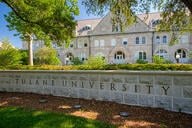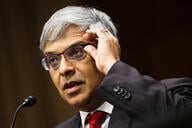You have /5 articles left.
Sign up for a free account or log in.
WASHINGTON -- The U.S. House of Representatives early Friday morning approved an increase in overall funding for research at the National Science Foundation but also endorsed an effort to pare social science studies that the agency funds.
By a 321 to 87 vote, lawmakers passed legislation that would fund the National Science Foundation at $7.4 billion for the fiscal year that begins this October. That represents a 3.2 percent increase from the current year, a larger increase than the 1.1 percent increase that the Obama administration had proposed in its budget.
Although research advocates praised the increase in overall funding, for the NSF and other science agencies that would be financed by the appropriations bill, supporters of the social sciences criticized an effort by Representative Lamar Smith of Texas to cut the agency's funding for the social sciences.
Smith’s amendment, adopted on a 208 to 201 vote, cut $15.35 million from the National Science Foundation’s research budget, but then restored that same amount. He said the amendment, also supported by House Majority Leader Representative Eric Cantor of Virginia, was aimed at redirecting that amount of money from the social, behavioral and economic sciences division at NSF to the physical sciences division.
“This amendment is only the first step,” Smith said on the House floor, citing the National Science Foundation policy legislation that the House's science committee approved this week.
Smith, who chairs the science panel, praised that legislation, known as the FIRST Act, which would drastically cut the funding targets for the social, behavioral, and economic sciences division. Smith and some other Republican lawmakers have questioned the legitimacy of some of the studies funded by that branch of the NSF.
That measure has generated considerable concern among research advocates because it would set funding targets for each individual directorate within the NSF.
But it is unclear how far that legislation will go. The House Republican leadership has yet to schedule a vote on the bill, and the Senate has not produced its version of the legislation.
The focus on the appropriations bill for the NSF, meanwhile, now moves to the Senate, where the appropriations committee has scheduled action on its own funding measure next week.
Defending Political Science
While this year's vote did include a symbolic attack on the social sciences and some anti-social science rhetoric, the measure didn't go as far as an appropriations bill last year that ended up banning the NSF from support political science work that didn't meet very narrow criteria. That vote stunned many political scientists, who were particular bothered by the way the measure was adopted with minimal public opposition.
This year, Representative David Price, a North Carolina Democrat who has a Ph.D. in political science and taught at Duke University before entering Congress, gave a speech explicitly endorsing the need for the NSF to support social sciences in general and political science specifically.
In years past, opponents of funding have cited the titles of grants to suggest that they are not worthy, but Price cited specific political science grants that he said have helped the country. For example, he said that NSF-backed research by scholars at Rice University and Louisiana State University explored public reactions to natural disasters, and has been used by policy makers to improve evacuation plans for future emergencies. He also cited work by the University of Notre Dame on third-party peace-making as important in a world of conflict.
The NSF uses "rigorous peer review" such that "only meritorious research is funded," he said. Price said that in an era when the Internet and public discourse are full of opinions that are not fact-based, the NSF is providing "clear, dependable peer-reviewed research" on which people can rely.
To those who doubt that the NSF is selecting worthy researchers to support, he noted that every American winner of the Nobel in economics since 1998 has been an NSF grantee.




